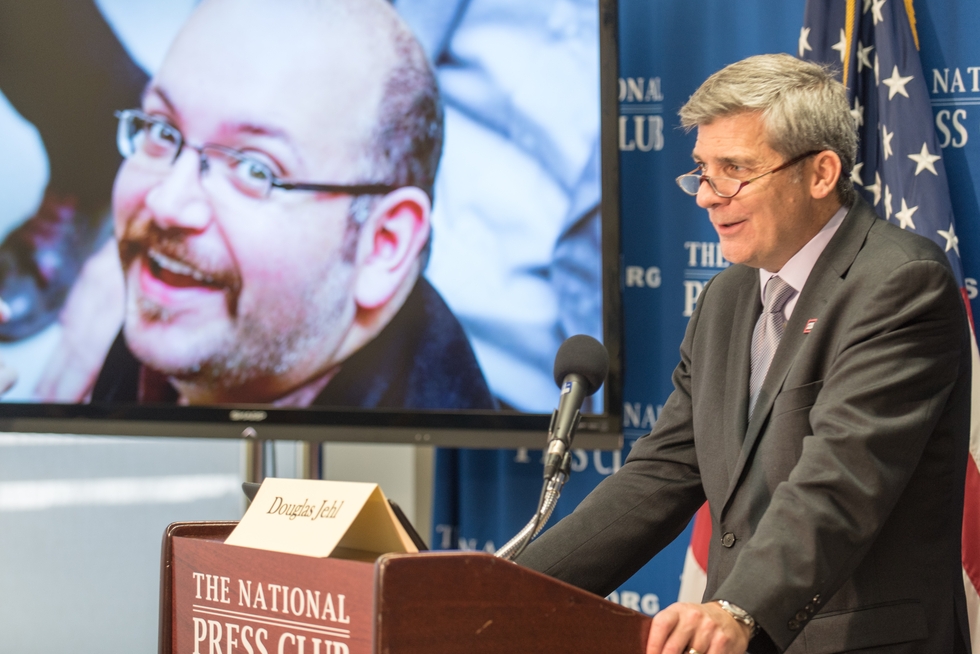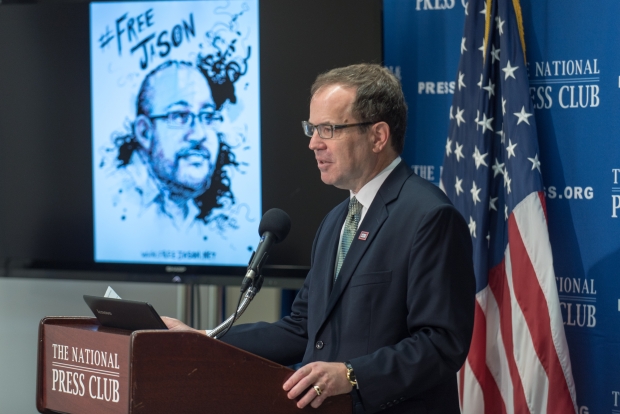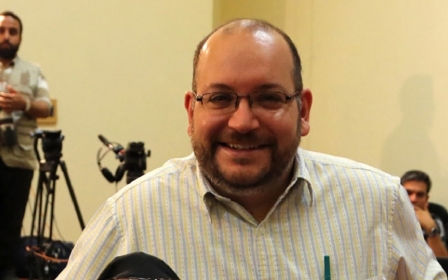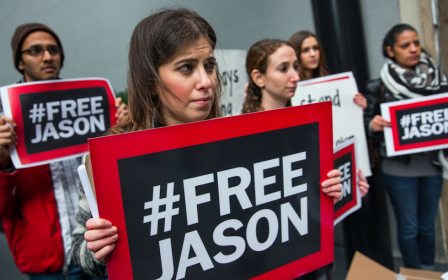Rezaian’s release greeted with celebration among Washington press

On Saturday morning, members of the Washington journalism community cautiously welcomed news from the Iranian press that Jason Rezaian, a journalist for the Washington Post, had been released from Iranian prison after being held for 544 days.
On Sunday morning, that caution turned to elation when The Washington Post confirmed that Rezaian and his wife, fellow journalist Yeganeh Salehi, had finally been allowed to leave Iran and were safely en route back to the United States.
Rezaian was released as part of a prisoner exchange that included three other Americans - former Marine Amir Hekmati, Christian preacher Saeed Abedini and Nosratollah Khosravi-Roodsari - for seven people facing charges by the United States. The deal also saw the dismissal of charges against 14 Iranians outside of the United States.
The Washington Post journalist was initially taken by the Iranians, along with Salehi, in July 2014. Held for months in solitary confinement in Evin prison, by the time of his release, Rezaian had been held longer than any other Western journalist in Iran.
“We are relieved that this 545-day nightmare for Jason and his family is finally over. We are pleased to see that Iran released four other Americans, and our hope is that those who remain held will soon follow,” Frederick Ryan, Jr, publisher of The Washington Post, said in a statement issued on Sunday morning. “After enduring such deplorable conditions and inhumane treatment, the top priority now must be Jason’s health and well-being.”
Raised in California, Rezaian holds dual citizenship from Iran and the United States, while Salehi is an Iranian citizen.
Iranian Foreign Minister Mohammad Javad Zarif told NPR in September 2014 that Iran didn’t recognise Rezaian’s American citizenship, and that Rezaian’s detention was an internal matter that the country was not obligated to explain to the US.
Salehi was released on bail in October 2014. In December 2014, Rezaian was charged in a closed-court proceeding, during which he was denied legal representation. In October 2015, Iranian news outlets reported that Rezaian had been convicted but did not provide information on charges.
Rezaian’s release during diplomatic negotiations over the Iranian nuclear deal and lifting of sanctions, followed a steady drumbeat by the Washington press corps and press freedom watch groups. More than 540,000 people signed a Change.org petition demanding Rezaian’s release, and social media campaigns using #FreeJason trended at various times over the course of his incarceration. In March 2015, boxing great Muhammad Ali called for Rezaian’s release.
The National Press Club, which held a 24-hour read-a-thon of Rezaian’s works, streamed globally, and invited journalists to gather as they waited for the news on Saturday. “Today is a wonderful day for all journalists everywhere, but it’s a day that didn’t need to happen, because Jason should never have been arrested, held, tried, or ‘convicted,’” National Press Club president Thomas Burr told Middle East Eye.
“He should have been reporting over the last 544 days about the Iranian government and not shoved into a solitary jail cell. We are excited for his release and can’t wait to welcome him back to Washington.”
Sherif Mansour, CPJ's Middle East and North Africa programme coordinator, said in a statement from Washington: "The farce of a judicial process that kept him in custody for 544 days has earned Tehran nothing but scorn from the international community.
"The Iranian government should begin taking steps immediately to improve its press freedom record by releasing all journalists imprisoned in relation to their work."
Excitement over the release tinged with anger over his imprisonment echoed throughout Washington over the weekend.
"Like journalists persecuted globally, Jason, like my own Al Jazeera co-workers, was targeted for practising his craft. That is unconscionable and must never happen,” Jeffrey Ballou, news editor at Al Jazeera English, told MEE.
“Journalism is not a crime. While I'm thrilled that Jason is being freed, he should have never been arrested and Iran's behaviour is inexcusable."
Cristina Maza, a journalist for Christian Science Monitor, told MEE: “The world is too dangerous for journalists these days, so every safe homecoming is a victory. And I do really hope this marks a new period of cordial diplomatic ties between the US and Iran. It would be nice to see diplomacy succeed in making the world safer.”
"It's about time. As Iran and the US continue to try to understand one another, reporting like Jason's is critical to inform both of our publics. I hope he returns swiftly to his good work," Paul Shinkman, national security senior writer at US News and World Report, a national print and online publication, told MEE.
Matt Laslo, the Washington bureau chief at Laslo Congressional Bureau and an adjunct professor of journalism, told MEE that the deal showed the power of diplomacy.
“There were several organisations steadily pounding the drumbeat for Jason’s return, but you didn’t see the national media covering it constantly,” Laslo said. “They seemed to take a step back and allow the process to work. It’s a beautiful statement on the power of statecraft, and it seems to have paid off.”
Shortly after his remarks, the Huffington Post announced one of its journalists had been told on-the-record that negotiations were underway by a State Department official, and had opted not to run the story to protect the process.
According to the Committee to Protect Journalists, Iran is one of the leading jailers of journalists. In 2015, CPJ reported that 199 journalists were jailed worldwide.
Note: The author is a member of the Board of Governors of the National Press Club in Washington, and participated in Free Jason campaigns.
New MEE newsletter: Jerusalem Dispatch
Sign up to get the latest insights and analysis on Israel-Palestine, alongside Turkey Unpacked and other MEE newsletters
Middle East Eye delivers independent and unrivalled coverage and analysis of the Middle East, North Africa and beyond. To learn more about republishing this content and the associated fees, please fill out this form. More about MEE can be found here.





